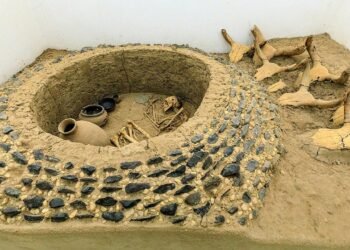Issam Menfi, a Libyan archaeology researcher, discovered the head of a statue belonging to Bacchus, the ancient Greek god of wine, near the ancient city of Cyrene. This Greek-era artifact, found within a water channel near the city’s valleys, marks the third such discovery resulting from the aftermath of the storm “Daniel” that struck the eastern region last September.

The ancient city of Cyrene, situated in the al-Jabal al-Akhdar region of eastern Libya, boasts a rich history dating back to its founding in 631 BCE by emigrants from the Greek island of Thera.
The city flourished under the rule of the Battiads until it came under Roman control in 96 BCE. With a medical school and influential philosophers, Cyrene became a center of intellectual activity in the classical world. However, a revolt in 115 CE and a subsequent earthquake in 365 CE contributed to its decline, sealed by the Arab conquest in 642 CE.
Menfi, who meticulously preserved the artifact for detailed study, including weight measurement and size determination for research purposes, handed it over to the Antiquities Control Authority of Cyrene. The Libyan News Agency reported on the preservation efforts, emphasizing the significance of this find to the city’s history and heritage.
The statue, identified as Bacchus, known as Dionysus in the Roman era, represents the god of wine in ancient mythology. However, a debate arises over whether the statue’s head depicts Bacchus or Dionysus, with both being functionally similar gods.
The head of the statue is a noteworthy addition to Cyrene’s legacy. The myths surrounding Bacchus, also known as Dionysus, are diverse and often involve his role in promoting grape cultivation, winemaking, and religious festivities. Bacchus/Dionysus is associated with the pleasures of life, including the enjoyment of wine and revelry.
The worship of Bacchus/Dionysus played a significant role in ancient Greek and Roman religious practices and cultural traditions, involving various festivals and celebrations characterized by music, dance, and the consumption of wine. The origin of Bacchus remains uncertain to ancient Greeks but is believed to be of Asian descent.























